We got off to a smooth enough start. We left Chengdu and the last familiar faces we’ll see until Thailand. We set out semi-early on a Sunday morning into the non-stop traffic of the massive Chinese city. Within five minutes I hit a huge bump, sending Dave’s strawberry stocking candy flying out of the outer pouch of my handlebar bag. I slammed on my brakes to stop and collect the candy then BOOM! I got rear-ended by a scooter! Hmmm… obviously riding in China was going to take a higher level of diligence in paying attention. I eased my way out of the bike lane and propped my bike up to gather the scattered candy. Dave waited patiently up ahead.
And we were off again. Fortunately the only other mishap of the day was taking directions from an English-speaking Chinese guy who didn’t actually know the name of the road we were looking for. I suppose we should have asked more than one person instead of just listening to him and changing our course. But thankfully, he realized his error, and only 2.5 kilometers down the road, he found us and sent us back on the proper route—the one we had been on in the first place.
This road—the G-213—would be our close companion for the days ahead toward ZhaoTong. As we left Chengdu, we had a big question mark—would we ride all the way to Kunming (about 900 km), or would we stop in ZhaoTong (about halfway) and take alternate transport? We had gotten input on our route from Brian with Adventure Access. His company, based out of Chengdu, organizes expedition-style travel into the nearby mountains. We had connected with him to get help with obtaining our visas, and as a part of the service, he provided us with input and guidance on our route to Vietnam. Ultimately, we would base our decision on timing, as we only have 30 days on our Chinese visas.
We pedaled out of busy Chengdu and within 30 kilometers were on a four-lane small highway. Loads of scooters, motorcycles, bikes and other vehicles occupied the right lane, so we were in good company. The only downer was the constant honking. Trucks, buses, even normal cars—everyone felt necessary to warn us they were coming with a loud blast of the horn. This would get particularly noisy in cities. Chaos abounds in these towns as pedestrians roam without looking, motorcycles ride along going the wrong way, and all the while, we pushed forward hoping we weren’t missing a sign that says the G-213 had made an unexpected turn.
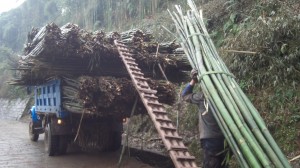
Overloaded trucks also crowd the roads. This guys was in the process of loading bamboo–there were lots more bundles to go! Not sure how they manage to squeeze so much on these vehicles!
We stopped in Leshan to have a look at the “Grand Buddha” carved into the side of the mountain overlooking the river. We’re not big into checking out Buddhas, but this was an interesting site right on our route, so we made a quick visit. On the way into Leshan, I had my second scooter encounter. This time a guy was coming out from around the corner of a construction zone, and in typical Chinese driving fashion, didn’t bother much with looking before easing out. BAM! I ran right into him. I had been adjusting my glove, so I couldn’t pull on my brakes as fast as I normally would have. I stopped, gathered myself, and looked him dead in the eye for a solid three seconds. I gave him my worst, “I’m not very happy with you look,” then turned and pedaled on. I’m not sure, but I think he was trying not to laugh. I imagined him later, going back to the house, playing cards with the guys, and cracking them up with his story of almost taking out a foreigner on her overloaded bicycle.
A few days out of Leshan, the G-213 highway took a turn for the worse. It started by taking us through a ridiculous, mud bog construction zone. We have never seen mud like this. Mud that sucked in our bike tires and shoes, almost impossible to even push through, much less ride. After eight grueling kilometers and two hours of heaving and hauling our bikes, we emerged on the other side–the unpaved G-213.
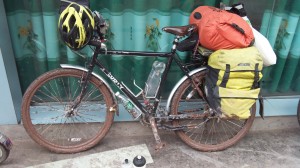
You can’t fully appreciate from this photo the quantity of mud that was stuck on our bikes… but you can at least get an idea.
Gone were the days of smooth sailing on the paved highway. The nice part was the decrease in traffic–only motorcycles and dump trucks ventured along this route. The not-so-nice part was the decrease in pace–the bumps from rocks, large and small, meant we were going slower both on the uphill and the down. Our bikes bore the evidence of the mud zone through which we had recently passed. It was caked into every nook and cranny of our tires, brakes, gears and pedals. We opted (unwisely) to not stop and rinse them off since the G-213 could be even more muddy ahead. Though the road conditions were rough, the scenery was stunning. Finally, we were out of the cities and into rural China. Small villages along the way kept us from feeling completely isolated as we worked our way up into the mountains. The people seemed friendly, and when we were ready to stop for the night, we pointed to our Chinese guide sheet (made by our friends in Chengdu) that said, “We have a tent. Can we stay right here?”
As we began riding into the mountains, the altitude gain brought a drop in temperature. As if it wasn’t cold enough already. Let’s just take a moment to talk about the cold in China. Back in the day, it was decided by the government that there would be no central heat in buildings south of some river. So people are allowed to have space heaters, but oddly enough, they have opted instead to simply embrace the cold. Their buildings have no insulation, they leave doors and windows open, and they have no heaters or fires. It’s just COLD. If you get cold while riding, there’s no ducking inside to get a break from it. It’s not uncommon, actually, for it to be even more cold inside! During the day, the temperature usually hovers between 30-40 degrees Fahrenheit (0-5 degrees Celsius). We’ve ridden in the cold before, but not with this kind of consistency. I began to look forward to climbing into my warm sleeping bag each night. Getting out of the tent each morning became more and more challenging.
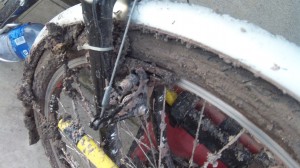
The morning after the G-213 mud bath–all of the mud got frozen solid on our bikes during the night! Whoops! Should have washed it off when we could. Now it was stuck on for a few days.
Packing up the icy tent and gear was a slow process, and combined with our slower riding, we weren’t making very good time. It became obvious that we wouldn’t have time to ride all the way to Kunming. In fact, we were going to be hard pressed to make it all the way to ZhaoTong. We were determined to press through and not let China get the better of us. But then, China struck us in the hardest way–in Dave’s stomach. We arrived in the small town of XiShaXiang, and Dave had been feeling unsettled much of the day. That night we paid for a “hotel” room where we could get a hot shower, then sleep inside (it was about 35 degrees in the room). In the middle of the night, Dave woke up with nausea, severe stomach pain, and diarrhea. After his frequent trips to the bathroom, I began to have concern about him becoming dehydrated. So we made a tough decision–skip riding the G-213 and get a truck to a bigger city. Why? Because I don’t trust hospitals in developing countries unless it’s in a real city. If we were going to need a hospital visit (flashing back to Guatemala), I refused to do it in a rural area. It’s never fun to feel like you’re conceding to your circumstances, but there are some situations where it’s not worth taking the risk. So we rented a truck for the day, and we covered the last 200 kilometers to ZhaoTong the “fast” way.
In ZhaoTong, we rented a real hotel room, heater and all, and let Dave rest for a few days. He took some strong anti-parasitic meds recommended by our friends, and was feeling better within 24 hours. So we covered the last bit to Kunming in the bus. That’s where we are now… getting ready to head from here to Vietnam, which should take just under a week of riding. We have to leave China on January 18 exactly–the last day on our Chinese visa and the first day on our Vietnamese visa.

What do we do when we rent a nice hotel room? Haul our bikes inside and put them in the shower for a bath! Finally the mud came off!
Despite its challenges and complications, China has been beautiful and fun in its own way. It has been good to get back into the rhythm of riding, into our routine of life on the road.

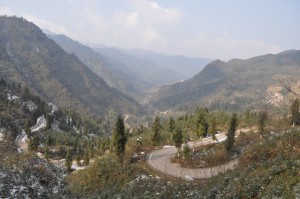
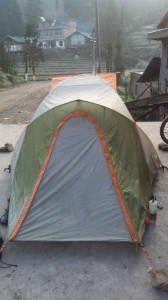
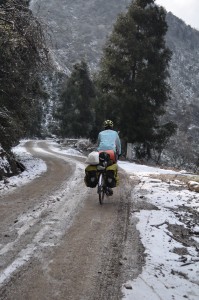
2 comments
Julie says:
Jan 13, 2013
Greetings from AL!Sorry y’all have had a rough go of it the last few days. I will continue to keep you both in my prayers especially for the next week.
wade & allison says:
Jan 13, 2013
Sounds like China from someone who has been here firsthand. You’re welcome back anytime 🙂 We enjoyed the read. It sounded like somewhere we’ve been before.